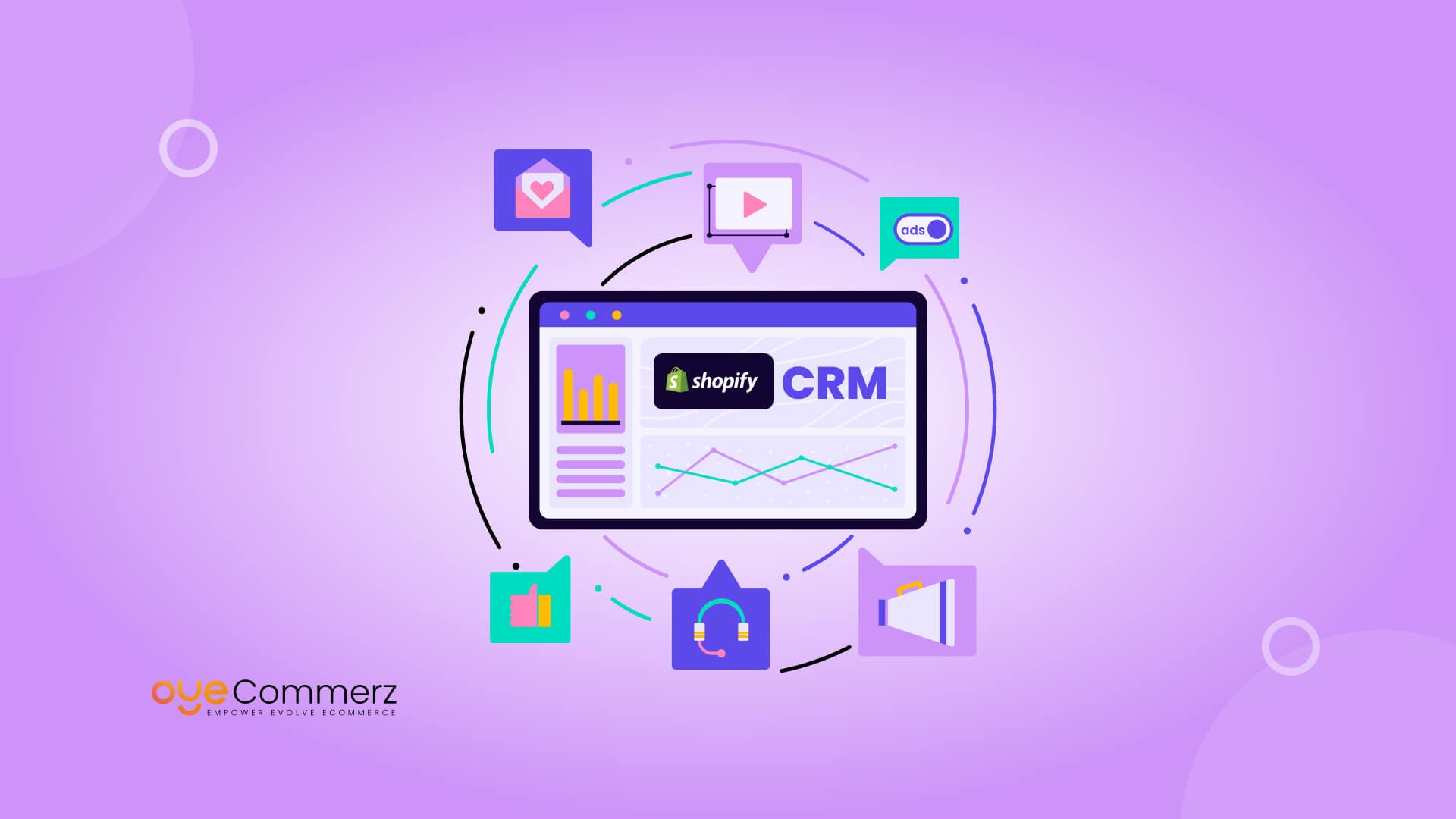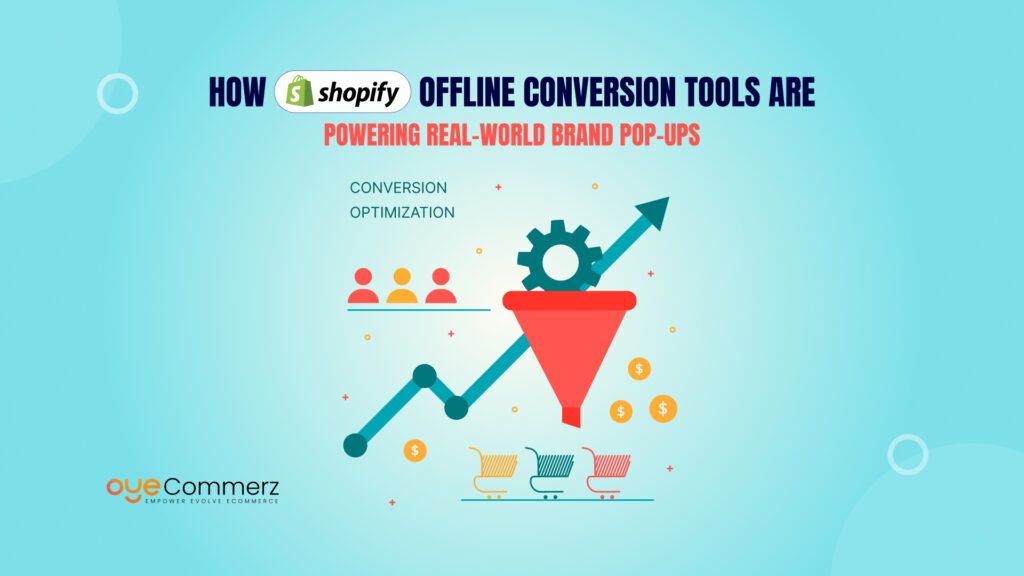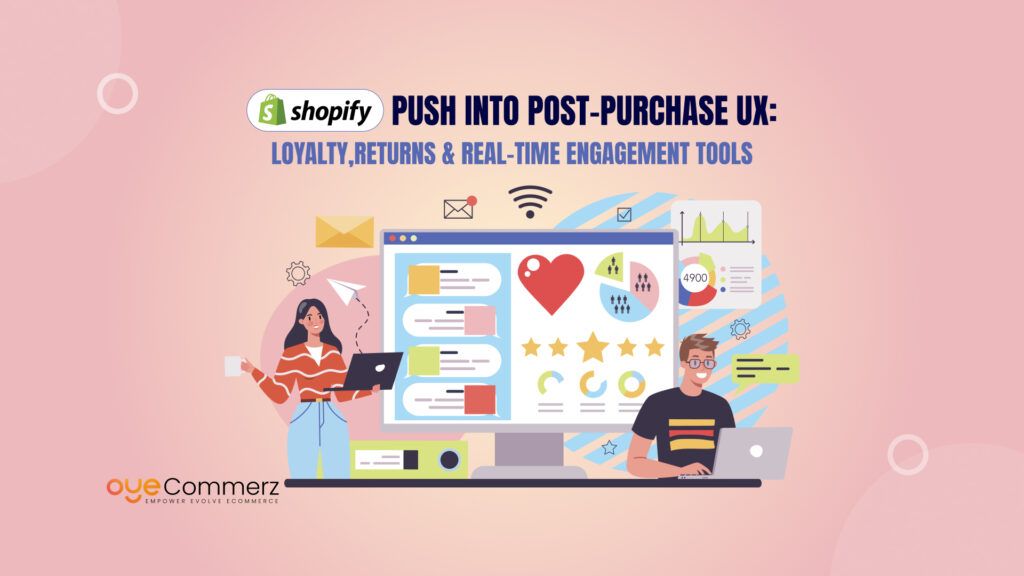“Struggling to keep up with customer interactions, orders, and marketing while trying to grow your eCommerce business?” Many Shopify store owners face difficulties managing customer relationships effectively as their business scales. Handling multiple customer touchpoints manually often leads to delays, errors, and missed opportunities, ultimately affecting customer satisfaction and revenue growth.
Integrating a Customer Relationship Management (CRM) system with Shopify allows you to streamline processes, automate tasks, and improve customer engagement. With the right Shopify CRM features, you can transform how you interact with customers and make data-driven decisions to scale faster.
This blog explores 8 powerful Shopify CRM features that help automate and simplify your business operations while enhancing customer experience.
Table of Contents
ToggleWhy You Need a CRM for Your Shopify Store
Understanding CRM Basics:
A CRM is more than just a database, it’s a powerful system that helps businesses manage customer interactions, automate communication, and personalize the buying journey. For Shopify store owners, a CRM bridges the gap between managing customer data and delivering a seamless shopping experience. It centralizes all customer information, making it easier to track interactions, preferences, and purchase history in one place.
Challenges Without CRM:
Without a CRM, Shopify store owners often struggle with:
- Lack of centralized customer data: Customer information is scattered across multiple platforms, making it difficult to create personalized marketing strategies.
- Difficulty tracking leads and follow-ups: Manual processes lead to missed follow-ups, resulting in lost sales opportunities.
- Inefficient customer segmentation and personalization: Without a CRM, segmenting customers based on their behavior and preferences is time-consuming and inaccurate.
How CRM Improves Business Efficiency
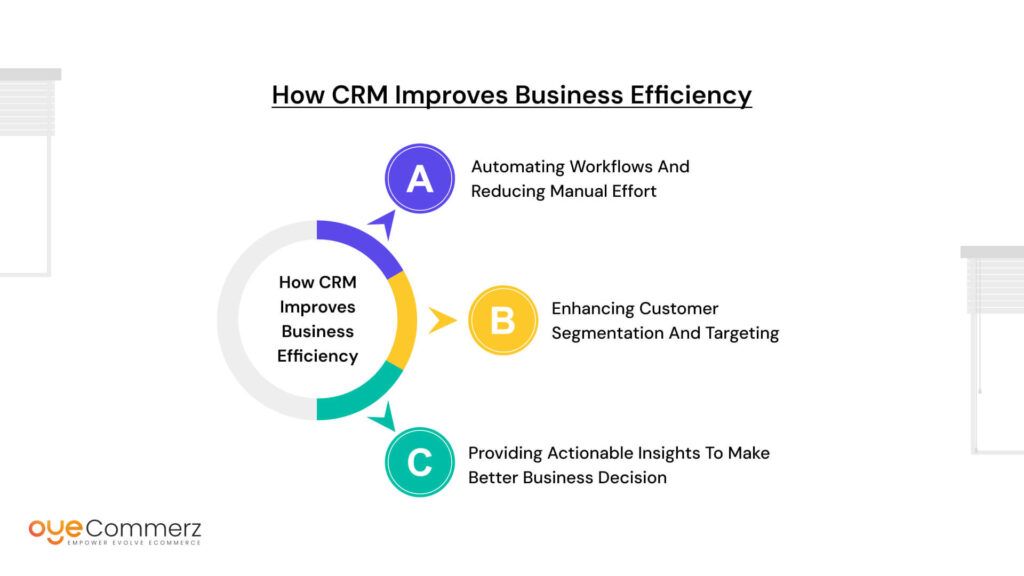
Implementing a CRM system can significantly enhance the efficiency of a Shopify store by automating processes, improving customer targeting, and providing valuable insights. As a Shopify store grows, manually managing customer interactions and order processes becomes time-consuming and error-prone. A well-integrated CRM simplifies these tasks and ensures seamless operations.
1. Automating Workflows and Reducing Manual Effort
A CRM automates repetitive tasks such as sending follow-up emails, updating customer profiles, and managing orders. Without automation, these tasks can consume valuable time and lead to inconsistencies. CRMs like HubSpot and Klaviyo automatically trigger actions based on customer behavior, ensuring timely communication and reducing the chances of human error. This improves overall operational efficiency and allows business owners to focus on strategic growth.
2. Enhancing Customer Segmentation and Targeting
Personalizing marketing efforts is essential for improving customer engagement and conversion rates. CRMs segment customers automatically by analyzing data such as purchase history, site activity, and engagement patterns. This segmentation allows Shopify store owners to create highly targeted campaigns that resonate with specific customer groups. For example, by identifying loyal customers and offering them exclusive discounts, businesses can increase repeat purchases and customer satisfaction.
3. Providing Actionable Insights to Make Better Business Decision
A CRM provides detailed analytics that help Shopify store owners monitor customer behavior, identify trends, and assess the effectiveness of marketing campaigns. With access to actionable insights, businesses can fine-tune their marketing strategies, adjust pricing models, and optimize product offerings to maximize revenue. By leveraging data-driven decisions, Shopify store owners can stay ahead of the competition and meet customer demands effectively.
In conclusion, integrating a CRM with Shopify not only saves time and reduces errors but also empowers store owners to build stronger customer relationships, drive sales, and scale their business efficiently.
8 Shopify CRM Features That Drive Automation & Simplification
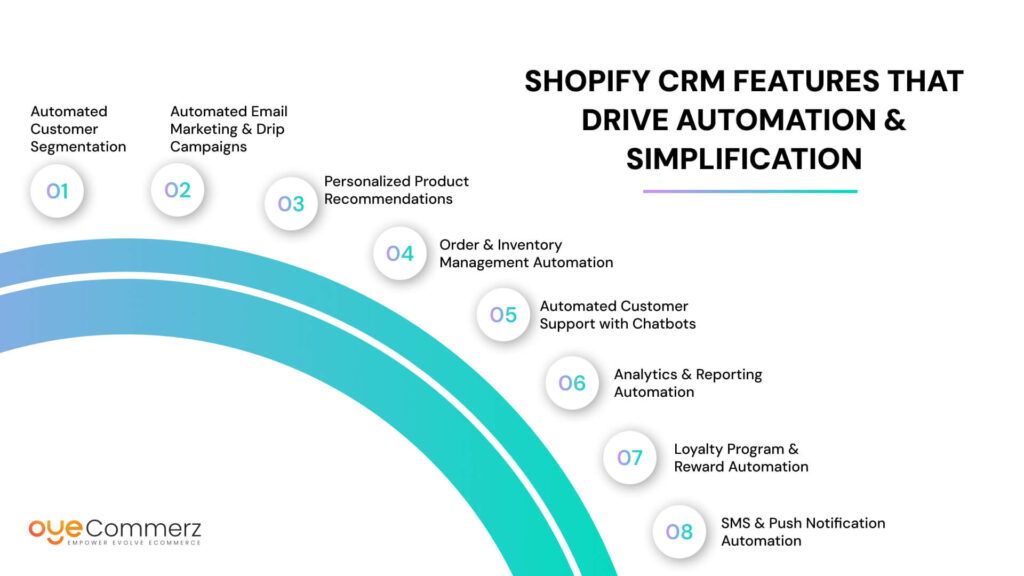
Managing customer interactions manually may work when your Shopify store is small, but as it grows, the need for automation becomes essential. Shopify CRM features are designed to handle these challenges by streamlining processes and enhancing customer engagement. Below are 8 powerful CRM features that automate and simplify your business operations.
1. Automated Customer Segmentation
Problem:
As your Shopify store scales, you attract a diverse range of customers with different preferences, purchasing habits, and engagement levels. Segmenting these customers manually to deliver relevant content and offers can become overwhelming and prone to errors. Without proper segmentation, you risk sending irrelevant messages that fail to engage customers, ultimately reducing conversion rates and customer satisfaction.
Solution:
Shopify CRM features enable automated customer segmentation by analyzing purchase history, browsing behavior, and engagement patterns. Platforms automatically segment customers into categories based on predefined conditions. These categories can include first-time buyers, repeat customers, high-value clients, and inactive users. This level of segmentation allows for more personalized and targeted communication, leading to improved customer retention and sales.
Benefit:
- Create highly targeted marketing campaigns that resonate with specific audience groups.
- Increase customer engagement by delivering relevant offers and content.
- Reduce manual effort and time spent on managing customer lists.
Implement dynamic segments that automatically update as customers interact with your store. Set up conditions to trigger email sequences or promotions based on customer behavior. This approach ensures that you engage customers at the right time with relevant content, boosting the chances of conversion.
2. Automated Email Marketing & Drip Campaigns
Problem:
As your Shopify store expands, manually following up with customers at different stages of the buying journey becomes unsustainable. Abandoned carts, new sign-ups, and post-purchase communications require timely responses, and manual processes often lead to missed opportunities. Without consistent and personalized communication, customer engagement declines, and retention rates drop.
Solution:
Shopify CRM features facilitate automated email marketing and drip campaigns tailored to various customer journeys. Platforms allow you to set up email sequences that automatically trigger based on customer actions. These sequences include welcome emails for new subscribers, abandoned cart reminders to re-engage potential buyers, and post-purchase follow-ups to encourage repeat purchases.
Benefit:
- Nurture leads effectively by delivering timely and relevant content.
- Increase customer retention by maintaining regular engagement.
- Boost conversion rates through personalized product recommendations
Use email templates that dynamically adjust content based on customer behavior. Segment your audience and create specialized email sequences that address different customer needs. This approach ensures that your communication remains relevant and encourages repeat purchases.
3. Personalized Product Recommendations
Problem:
Without personalized product recommendations, your Shopify store risks offering irrelevant suggestions that do not resonate with customers. This lack of relevance can lead to lower conversion rates, reduced average order value (AOV), and missed upsell opportunities. Manually curating recommendations is not scalable, especially as your product catalog grows.
Solution:
AI-powered Shopify CRM features analyze browsing behavior, purchase history, and customer preferences to deliver personalized product recommendations. These recommendations appear on product pages, during checkout, and in follow-up emails, encouraging customers to explore additional items. Platforms utilize machine learning algorithms to refine recommendations and align them with individual customer preferences.
Benefit:
- Increase AOV by suggesting complementary and higher-value products.
- Enhance customer satisfaction by offering relevant suggestions.
- Improve customer engagement by providing tailored shopping experiences.
Set up upsell and cross-sell recommendations on key pages such as product pages, cart, and checkout. Use dynamic recommendation engines that update in real time as customers interact with your store, ensuring that the suggestions remain relevant and effective.
4. Order & Inventory Management Automation
Problem:
Manually tracking orders and managing inventory across multiple channels can quickly become overwhelming, leading to errors, stockouts, and delays. As your Shopify store grows, inefficient order management can result in overselling, customer dissatisfaction, and increased operational costs.
Solution:
Shopify CRM features offer automated order and inventory management solutions that synchronize inventory updates with order processing. Platforms ensure that inventory levels are updated in real time as orders are placed, preventing stockouts and overselling. Automated workflows streamline order fulfillment, ensuring that customers receive their purchases promptly and accurately.
Benefit:
- Reduce human errors in order processing and inventory management.
- Prevent overselling and stockouts, maintaining customer trust.
- Improve fulfillment speed and accuracy.
Set up automated alerts to notify your team when stock levels are low, ensuring that high-demand products are always available. Use real-time inventory tracking to maintain accurate stock levels across all sales channels, preventing operational disruptions.
5. Automated Customer Support with Chatbots
Problem:
As your customer base grows, the volume of inquiries about product availability, order status, and returns increases. Handling these queries manually can overwhelm your support team, leading to delays and missed opportunities to resolve customer issues. Without timely responses, customer satisfaction declines, and retention rates drop.
Solution:
Shopify CRM features with chatbot integration provide 24/7 automated customer support. Platforms handle FAQs, order status inquiries, and basic troubleshooting, allowing human agents to focus on more complex issues. Chatbots deliver instant responses, enhancing customer satisfaction and reducing support workload.
Benefit:
- Reduce support team workload by automating repetitive tasks.
- Improve response time and customer satisfaction.
- Provide consistent and reliable assistance to customers.
Configure your chatbot to escalate complex queries to human agents seamlessly. Create a knowledge base with common customer queries that the chatbot can access, ensuring that responses are accurate and helpful.
6. Analytics & Reporting Automation
Problem:
Manually gathering and analyzing customer data, sales trends, and marketing performance can be time-consuming and prone to errors. Without accurate insights, making data-driven decisions becomes difficult, limiting your ability to optimize marketing strategies and enhance business growth.
Solution:
Shopify CRM features provide automated analytics and reporting tools that generate detailed insights into customer behavior, sales performance, and campaign effectiveness. Platforms like Shopify Analytics automatically compile and analyze data, presenting key performance indicators (KPIs) in easy-to-understand dashboards.
Benefit:
- Gain actionable insights to optimize marketing strategies.
- Monitor customer lifetime value (CLV) and retention rates.
- Make data-driven decisions to enhance business growth.
Customize dashboards to track the most important metrics for your business. Schedule automated reports to receive regular updates on performance trends, allowing you to identify areas for improvement and adjust your strategy accordingly.
7. Loyalty Program & Reward Automation
Problem:
Without an automated loyalty program, manually tracking customer points and rewards can become cumbersome and prone to inconsistencies. Managing these programs manually increases the risk of errors, delays, and dissatisfied customers, ultimately reducing the effectiveness of your customer retention efforts.
Solution:
Shopify CRM features integrated with platforms like Smile.io and Yotpo automate the management of loyalty programs. These platforms track customer points, issue rewards automatically, and notify customers when they are eligible for redemption. This seamless process encourages repeat purchases and strengthens customer loyalty.
Benefit:
- Boost customer retention and lifetime value through reward programs.
- Encourage repeat purchases with engaging incentives.
- Increase customer satisfaction by providing timely rewards.
Design tier-based loyalty programs that motivate customers to increase their spending to unlock exclusive rewards. Use automated notifications to remind customers of their reward points and expiration dates, ensuring they remain engaged with your brand.
8. SMS & Push Notification Automation
Problem:
Manually sending SMS and push notifications to inform customers about promotions, order updates, and abandoned carts can be inefficient and time-consuming. Without real-time communication, you risk missing critical opportunities to engage customers and drive conversions.
Solution:
Shopify CRM features allow for automated SMS and push notification campaigns using platforms like SMSBump and PushOwl. These tools schedule and deliver timely notifications about sales, order confirmations, and abandoned cart reminders, ensuring that customers stay informed and engaged.
Benefit:
- Keep customers informed and engaged with timely updates.
- Drive traffic to your store during promotional events.
- Reduce cart abandonment by sending timely reminders.
Schedule notifications during peak shopping hours to maximize customer engagement and conversions. Use segmented notifications to target specific customer groups with personalized offers and updates.
By leveraging Shopify CRM features, businesses can automate repetitive tasks, improve customer interactions, and drive higher revenue. Each of these features addresses common pain points and offers scalable solutions to optimize business processes. From automated customer segmentation and personalized product recommendations to order management and chatbot support, these CRM tools allow Shopify store owners to focus on growth while maintaining exceptional customer experiences.
The integration of these advanced features not only simplifies operations but also enhances customer satisfaction by delivering relevant and timely interactions. As your Shopify store continues to expand, using a CRM with robust automation capabilities ensures that you stay ahead of the competition.
To maximize the benefits of Shopify CRM features, evaluate your business needs, choose the right platform, and implement automation strategies that align with your goals. A well-implemented CRM empowers you to optimize your marketing efforts, improve operational efficiency, and build lasting customer relationships that drive long-term success.
How to Choose the Right CRM for Your Shopify Store
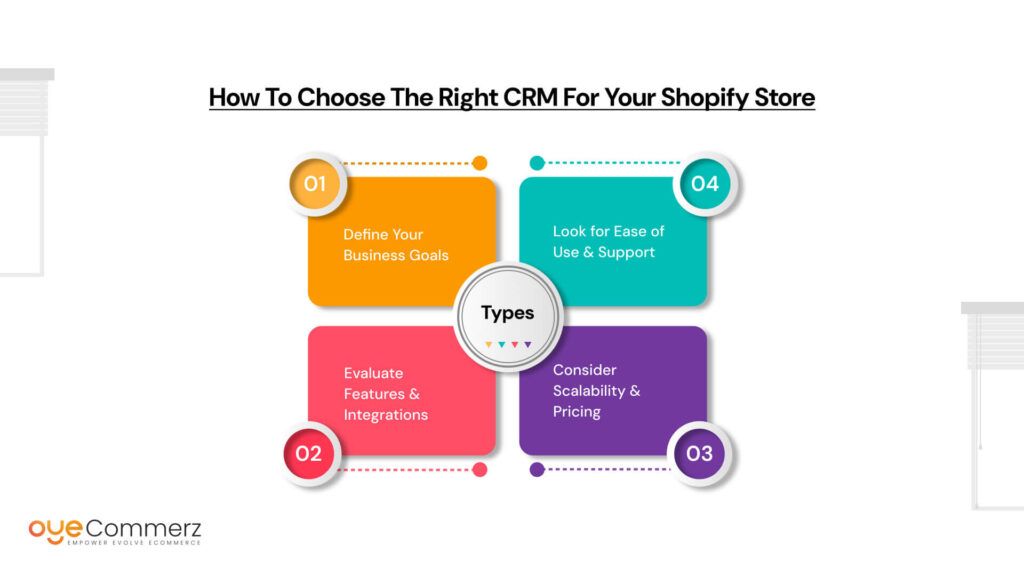
Selecting the right CRM for your Shopify store is a critical decision that can significantly impact your business growth. With numerous options available, it’s important to focus on features that align with your goals and operational requirements. Here’s how to make the best choice:
Define Your Business Goals:
Start by identifying what you want to achieve with a CRM. Do you want to improve customer engagement through personalized marketing? Are you looking for better order management or detailed analytics to understand your customers? Defining your goals helps narrow down the CRM options that offer the most relevant Shopify CRM features.
Evaluate Features & Integrations:
Not all CRMs are created equal. Look for a platform that integrates seamlessly with Shopify and offers automation features to streamline your business. Whether it’s automated email marketing, order management, or customer segmentation, choose a CRM that enhances your existing workflows.
Consider Scalability & Pricing:
As your business grows, your CRM should grow with it. Choose a platform that offers scalable features and flexible pricing models. Avoid committing to a CRM that meets only your current needs but lacks the ability to handle increased customer data and interactions as your store expands.
Look for Ease of Use & Support:
A CRM should be easy to use and come with reliable customer support. Complicated interfaces can slow down operations and lead to inefficiencies. Ensure the CRM provides adequate onboarding resources and ongoing support to help your team adapt quickly.
Test the CRM with a trial version to explore its features before committing. This hands-on experience helps determine whether the platform meets your expectations and integrates smoothly with your Shopify store.
Best Shopify CRMs to Consider
When choosing the best CRM for your Shopify store, it’s essential to consider platforms that offer automation, customer segmentation, and seamless integrations to enhance business operations. Here’s a detailed look at the top CRMs that stand out due to their robust Shopify CRM features:
1. HubSpot CRM
HubSpot CRM is a comprehensive platform that offers advanced marketing automation, lead management, and customer engagement tools. It integrates smoothly with Shopify, making it a powerful option for businesses looking to streamline their marketing and sales processes.
Key Features:
- Automated Lead Nurturing: HubSpot allows you to create personalized email workflows to nurture leads effectively.
- Pipeline Management: Visualize your sales pipeline, track deals, and manage customer interactions effortlessly.
- Customer Segmentation: HubSpot automatically segments customers based on their behavior, enabling targeted marketing campaigns.
2. Klaviyo
Klaviyo is a specialized email and SMS marketing platform designed for eCommerce businesses. It seamlessly integrates with Shopify to provide behavior-based automation that personalizes customer interactions.
Key Features:
- Email & SMS Automation: Create highly targeted email and SMS campaigns triggered by customer actions.
- Behavior-Based Segmentation: Klaviyo segments customers based on browsing history, purchase frequency, and engagement.
- Personalized Recommendations: Use customer data to deliver relevant product suggestions and promotions.
3. ActiveCampaign
ActiveCampaign is a powerful marketing automation and CRM platform that focuses on enhancing customer engagement through email and drip campaigns. It offers seamless Shopify integration to automate communication and manage leads efficiently.
Key Features:
- Drip Campaigns & Email Automation: Automate email sequences tailored to different customer journeys.
- Customer Behavior Tracking: Track and analyze customer interactions to personalize future communications.
- Sales Automation: Automate follow-ups, promotions, and order confirmations based on customer actions.
4. Gorgias
Gorgias is a customer support automation platform designed specifically for eCommerce businesses. It integrates directly with Shopify to provide real-time responses to customer inquiries, helping businesses improve their support process.
Key Features:
- Automated Ticket Management: Gorgias automates repetitive customer queries, reducing manual workload.
- Multi-Channel Support: Manage customer interactions across email, chat, social media, and SMS from one dashboard.
- Order Management Integration: View and modify orders directly from Gorgias while resolving customer queries.
5. Drip
Drip is an eCommerce-focused marketing automation platform that helps online businesses build and nurture customer relationships through personalized communication. It integrates seamlessly with Shopify to enhance customer engagement.
Key Features:
- Email & SMS Automation: Design workflows to send personalized messages at critical customer touchpoints.
- Customer Segmentation: Segment customers based on their behavior and purchase history for targeted outreach.
- Revenue Attribution: Measure the impact of your marketing efforts on sales and revenue.
Each of these Shopify CRMs offers unique advantages depending on your business goals and operational needs. HubSpot is great for managing marketing and sales pipelines, Klaviyo excels in personalized email marketing, ActiveCampaign provides powerful automation, Gorgias streamlines customer support, and Drip focuses on enhancing customer retention.
Businesses That Thrived with Shopify CRM
Adopting Shopify CRM features can significantly enhance business performance by automating processes and improving customer engagement. Here are three real-life examples of businesses that achieved remarkable success through CRM automation:
Example 1: How a Fashion Brand Boosts Repeat Purchases by 30%
Let’s say a growing fashion brand struggled with low customer retention despite a steady influx of new customers. They implemented a Shopify CRM that automated personalized email sequences such as welcome emails, abandoned cart reminders, and post-purchase follow-ups. By tailoring email content based on customer behavior and purchase history, the brand saw a 30% increase in repeat purchases within six months.
Example 2: Beauty Store Increases Average Order Value (AOV) by 25%
Imagine a beauty retailer wanted to enhance its upselling strategy but found that irrelevant product recommendations were hurting conversions. They integrated an AI-powered Shopify CRM that analyzed customer browsing behavior and purchase history to deliver personalized product recommendations. As a result, the store experienced a 25% increase in AOV by suggesting complementary products and bundled deals. According to Study, 76% of consumers expect personalized experiences, highlighting the importance of relevant product recommendations.
Example 3: Electronics Retailer Reduces Support Queries by 40%
Let’s say an electronics retailer was overwhelmed with customer inquiries about order status, shipping, and returns. They deployed a Shopify CRM with chatbot integration that automated responses to frequently asked questions. By providing instant answers, the retailer reduced support queries by 40% in just three months, freeing up the support team to handle more complex issues.
These examples demonstrate how Shopify CRM features can drive tangible results, improve customer satisfaction, and streamline business operations effectively.
Ready to transform your Shopify store with CRM automation?
Explore the best CRM solutions today with Oyecommerz and discover how automation can streamline your business operations, enhance customer satisfaction, and boost revenue effortlessly.
Contact us now!
Let's build your custom Shopify app today!
Conclusion
As your eCommerce business grows, managing customer relationships manually becomes increasingly difficult. Without a system in place, missed follow-ups, scattered data, and inconsistent communication can lead to lost sales and dissatisfied customers. Integrating a CRM with Shopify helps eliminate these challenges by centralizing customer data, automating key processes, and improving overall customer engagement.
A well-integrated CRM not only saves time but also empowers you to build stronger relationships, personalize communication, and boost customer loyalty. By streamlining your operations and providing valuable insights, a CRM enables you to make data-driven decisions that drive sustainable business growth. If you’re ready to take your Shopify store to the next level, now is the perfect time to invest in a CRM solution that scales with your business.

